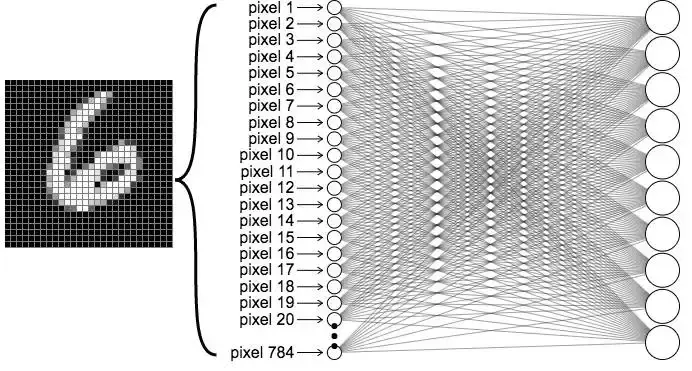图像识别是一种让计算机具备“看”与“理解”图像能力的人工智能技术,其目标是从图像或视频中提取有意义的信息,如物体、人物、场景或文字。在现实生活中,这项技术被广泛应用于面部识别、自动驾驶、安防监控、医疗诊断、图像搜索等多个领域。

图像识别的发展离不开**计算机视觉(Computer Vision)和深度学习(Deep Learning)**的持续演进。传统方法依赖人工设计特征(如边缘、角点、纹理等),而现在的主流方法是使用卷积神经网络(CNN)等深度模型,自动提取特征并进行分类或识别,大幅提升了准确率和泛化能力。
图像识别常见的任务包括:
-
图像分类:判断图像属于哪一类(如猫、狗、飞机等)
-
目标检测:定位图中出现的各类物体
-
图像分割:为图像中的不同区域赋予语义标签
-
面部识别:识别和匹配人脸信息
-
OCR(光学字符识别):从图像中提取文字内容
从手写数字识别到实用 OCR 工具
我最初通过一个 CNN 架构尝试识别手写数字,使用经典的 MNIST 数据集/自制的手写训练集进行训练。模型通过反向传播和梯度下降来降低预测误差,实现数字识别的功能。
代码开源地址:
👉 SimpleCNN - GitHub
不过,这个项目更适合教学与实验目的,在实际应用中无法直接应对复杂图像或模糊文字识别的需求。因此我转而使用一些成熟的图像识别 API 服务,比如阿里云的 OCR 识别服务,它对中文文字识别支持较好,使用方便,但在图像模糊或光线不佳时,识别准确率仍有限,需要配合图像预处理优化结果。
实用 OCR API 推荐(阿里云)
以下是我实际使用过,觉得比较实用的一些 API(整理备份,也方便其他人参考):
-
🔍 [阿里官方] 通用 OCR 文字识别 API
-
🔍 [阿里官方] 高精度 OCR 图像识别 API
阿里 OCR API 调用代码示例(Python)
这里是一个实际使用的调用代码,支持上传图片文件或图片链接:
# -*- coding: utf-8 -*-
import json
import base64
import os
import ssl
try:
from urllib.error import HTTPError
from urllib.request import Request, urlopen
except ImportError:
from urllib2 import Request, urlopen, HTTPError
context = ssl._create_unverified_context()
def get_img(img_file):
"""将本地图片转成base64编码的字符串,或者直接返回图片链接"""
# 简单判断是否为图片链接
if img_file.startswith("http"):
return img_file
else:
with open(os.path.expanduser(img_file), 'rb') as f: # 以二进制读取本地图片
data = f.read()
try:
encodestr = str(base64.b64encode(data), 'utf-8')
except TypeError:
encodestr = base64.b64encode(data)
return encodestr
def posturl(headers, body):
"""发送请求,获取识别结果"""
try:
params = json.dumps(body).encode(encoding='UTF8')
req = Request(REQUEST_URL, params, headers)
r = urlopen(req, context=context)
html = r.read()
return html.decode("utf8")
except HTTPError as e:
print(e.code)
print(e.read().decode("utf8"))
def request(appcode, img_file, params):
# 请求参数
if params is None:
params = {}
img = get_img(img_file)
params.update({'image': img})
# 请求头
headers = {
'Authorization': 'APPCODE %s' % appcode,
'Content-Type': 'application/json; charset=UTF-8'
}
response = posturl(headers, params)
print(response)
# 请求接口
REQUEST_URL = "https://tysbgpu.market.alicloudapi.com/api/predict/ocr_general"
if __name__ == "__main__":
# 配置信息
appcode = "你的APPCODE"
img_file = "图片链接/本地图片路径"
params = {
"configure": {
"min_size": 16, # 图片中文字的最小高度,单位像素(此参数目前已经废弃)
"output_prob": True, # 是否输出文字框的概率
"output_keypoints": False, # 是否输出文字框角点
"skip_detection": False, # 是否跳过文字检测步骤直接进行文字识别
"without_predicting_direction": False, # 是否关闭文字行方向预测
}
}
request(appcode, img_file, params)
你只需要填入你的 AppCode 和图片地址即可直接运行。
以及 动态爬虫+OCR识别自动登录人民邮电出版社
recognition.py
# -*- coding: utf-8 -*-
import json
import base64
import os
import ssl
try:
from urllib.error import HTTPError
from urllib.request import Request, urlopen
except ImportError:
from urllib2 import Request, urlopen, HTTPError
context = ssl._create_unverified_context()
def get_img(img_file):
"""将本地图片转成base64编码的字符串,或者直接返回图片链接"""
# 简单判断是否为图片链接
if img_file.startswith("http"):
return img_file
else:
with open(os.path.expanduser(img_file), 'rb') as f: # 以二进制读取本地图片
data = f.read()
try:
encodestr = str(base64.b64encode(data), 'utf-8')
except TypeError:
encodestr = base64.b64encode(data)
return encodestr
# 请求接口
REQUEST_URL = "https://gjbsb.market.alicloudapi.com/ocrservice/advanced"
def posturl(headers, body):
"""发送请求,获取识别结果"""
try:
params = json.dumps(body).encode(encoding='UTF8')
req = Request(REQUEST_URL, params, headers)
r = urlopen(req, context=context)
html = r.read()
return html.decode("utf8")
except HTTPError as e:
print(e.code)
print(e.read().decode("utf8"))
def request(appcode, img_file, params):
# 请求参数
if params is None:
params = {}
img = get_img(img_file)
if img.startswith('http'): # img 表示图片链接
params.update({'url': img})
else: # img 表示图片base64
params.update({'img': img})
# 请求头
headers = {
'Authorization': 'APPCODE %s' % appcode,
'Content-Type': 'application/json; charset=UTF-8'
}
response = posturl(headers, params)
return response
def run():
"""
运行函数
:return:
返回识别结果
"""
return request(appcode, img_file, params)
if __name__ == '__main__':
# 请求接口
REQUEST_URL = "https://gjbsb.market.alicloudapi.com/ocrservice/advanced"
# 配置信息
appcode = "95eaaede7e784cb0a87ab55c8445a766"
img_file = "./captcha.png"
params = {
# 是否需要识别结果中每一行的置信度,默认不需要。 true:需要 false:不需要
"prob": False,
# 是否需要单字识别功能,默认不需要。 true:需要 false:不需要
"charInfo": False,
# 是否需要自动旋转功能,默认不需要。 true:需要 false:不需要
"rotate": False,
# 是否需要表格识别功能,默认不需要。 true:需要 false:不需要
"table": False,
# 字块返回顺序,false表示从左往右,从上到下的顺序,true表示从上到下,从左往右的顺序,默认false
"sortPage": False,
# 是否需要去除印章功能,默认不需要。true:需要 false:不需要
"noStamp": False,
# 是否需要图案检测功能,默认不需要。true:需要 false:不需要
"figure": False,
# 是否需要成行返回功能,默认不需要。true:需要 false:不需要
"row": False,
# 是否需要分段功能,默认不需要。true:需要 false:不需要
"paragraph": False,
# 图片旋转后,是否需要返回原始坐标,默认不需要。true:需要 false:不需要
"oricoord": True
}
message = request(appcode, img_file, params)
print(message['content'])
# import json
# message = '{"sid":"95246a4ddeadba2492f40f4e4be26315d0abf8aae801ca51727b6c677632bd3ac000a754","prism_version":"1.0.9","prism_wnum":1,"prism_wordsInfo":[{"word":"me3xy","pos":[{"x":2,"y":8},{"x":63,"y":8},{"x":63,"y":30},{"x":2,"y":30}],"direction":0,"angle":-90,"x":21,"y":-11,"width":22,"height":61}],"height":34,"width":68,"orgHeight":34,"orgWidth":68,"content":"me3xy ","algo_version":""}'
# # 怎么获取content中的信息
# print(json.loads(message)['content'])
main.py
import requests
from selenium import webdriver
from selenium.webdriver.common.by import By
from selenium.webdriver.common.action_chains import ActionChains
import time
from PIL import Image
url = 'https://www.ptpress.com.cn/login'
# 无头浏览器配置
options = webdriver.ChromeOptions()
options.add_argument('--headless') # 无头模式
options.add_argument('--disable-gpu')
options.add_argument('--no-sandbox')
driver = webdriver.Chrome(options=options) # options: 无头模式
driver.get(url=url)
time.sleep(2)
# 找到验证码图片元素
captcha_img = driver.find_element(By.XPATH, '//*[@id="loginForm"]/div[3]/div[2]/div/img')
# 保存验证码图片(可选)
captcha_img.screenshot('captcha.png')
im = Image.open('./captcha.png')
im.show()
# ----------------------------------------------------
# 图像识别
import recognition
# 请求接口
REQUEST_URL = "https://gjbsb.market.alicloudapi.com/ocrservice/advanced"
# 配置信息
appcode = "95eaaede7e784cb0a87ab55c8445a766"
img_file = "./captcha.png"
params = {
# 是否需要识别结果中每一行的置信度,默认不需要。 true:需要 false:不需要
"prob": False,
# 是否需要单字识别功能,默认不需要。 true:需要 false:不需要
"charInfo": False,
# 是否需要自动旋转功能,默认不需要。 true:需要 false:不需要
"rotate": False,
# 是否需要表格识别功能,默认不需要。 true:需要 false:不需要
"table": False,
# 字块返回顺序,false表示从左往右,从上到下的顺序,true表示从上到下,从左往右的顺序,默认false
"sortPage": False,
# 是否需要去除印章功能,默认不需要。true:需要 false:不需要
"noStamp": False,
# 是否需要图案检测功能,默认不需要。true:需要 false:不需要
"figure": False,
# 是否需要成行返回功能,默认不需要。true:需要 false:不需要
"row": False,
# 是否需要分段功能,默认不需要。true:需要 false:不需要
"paragraph": False,
# 图片旋转后,是否需要返回原始坐标,默认不需要。true:需要 false:不需要
"oricoord": True
}
data = recognition.request(appcode, img_file, params)
import json
data = json.loads(data)['content']
print(data)
# -----------------------------------------------------
# 输入用户名、密码和验证码(这里验证码需要手动输入或者使用第三方验证码识别服务)
username = ''
password = ''
# verify_code = input('请输入验证码:') # 手动输入验证码
driver.find_element(By.XPATH, '//*[@id="loginForm"]/div[1]/input').send_keys(username)
driver.find_element(By.XPATH, '//*[@id="loginForm"]/div[2]/input').send_keys(password)
driver.find_element(By.XPATH, '//*[@id="loginForm"]/div[3]/div[1]/div/input').send_keys(data)
# 点击登录按钮
driver.find_element(By.XPATH, '//*[@id="loginBtn"]').click()
time.sleep(3) # 等待登录结果
page_source = driver.page_source
print(page_source)
driver.quit()
小结与感想
图像识别技术是一个非常实用又持续进化的领域。虽然自己动手训练 CNN 模型很有成就感,但面对实际应用场景,使用成熟的云服务往往更高效也更稳定。当然,这也让我意识到:图像识别不仅是“训练模型”,更是一个包括图像采集、预处理、模型调用、结果处理的完整链条。























 1153
1153

 被折叠的 条评论
为什么被折叠?
被折叠的 条评论
为什么被折叠?








